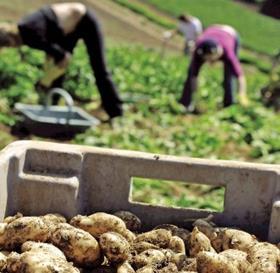
UK potato growers could be missing out on £700 per hectare due to inefficiencies affecting their yields and margins, the AHDB has estimated.
Speaking at the Farming Scotland Conference in Carnoustie, AHDB potatoes strategy director Rob Clayton told producers that improvements in seed rates and energy efficiency could be worth approximately £37,000 a year to the average grower. The finding is based on AHDB analysis of some of the top 25 per cent of British potato producers.
Clayton said: “Farmers are not collecting this extra income for a number of reasons. Changes to seed and nitrogen rates and making simple investments to improve store performance can make a real difference to the bottom line.
“We need to work on supporting producers to changes their practices to improve productivity and increase their yields and margins. Our Strategic Potato Farm Programme is a key part of those efforts.”
When AHDB last analysed the figures in 2015 average UK potato yields were 48.8 tonnes per hectare, while Germany, France and Belgium were achieving yields of over 50t per hectare. Belgium was particularly strong with 56.2 tonnes on average.
While this is partly down to environmental factors such as soil quality and weather as well as variety mix, the AHDB analysis demonstrates that there is room to increase those figures.
Clayton also called on the industry to embrace and incorporate the changing tastes of consumers. The consumption of fresh potatoes has long been declining, partly due to a greater diversity of products, but there are growing markets, which the industry can and should exploit, he believes.
Clayton said: “Many consumers are looking for convenience; they are looking for meal time solutions rather than ingredients. Because of this we see the chilled potato sector is growing – chilled mash, or roast potatoes, for example – and we need to make sure we are tapping into this.
“Premium potato products are also important – especially as we see a global surge in the middle classes. Not only do we need to produce more of such products, but we need to build relationships with those growing global markets which are looking out for these premium goods.”



